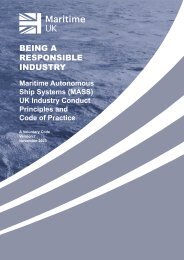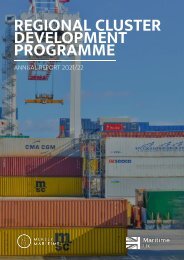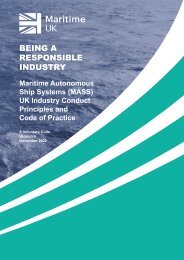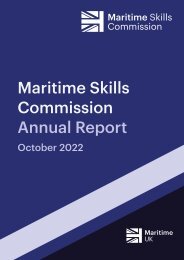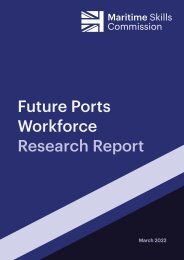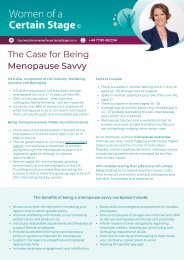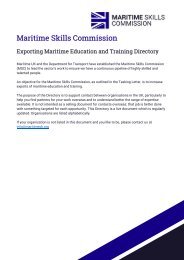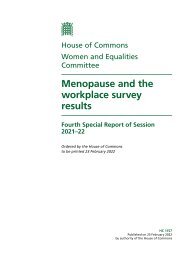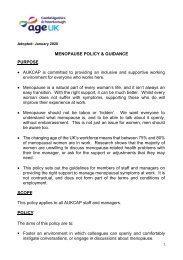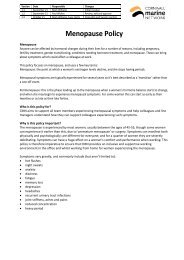code_of_practice_V3_2019
Create successful ePaper yourself
Turn your PDF publications into a flip-book with our unique Google optimized e-Paper software.
n RCC Operator<br />
– Receives commands from the Watch Officer;<br />
– Responsible for the MASS command and control when operated by the RCC;<br />
– Responsible for mission planning, execution and post mission evaluation;<br />
– Could be fully or partially responsible (shared by payload operator) for launch and recovery <strong>of</strong> vehicle<br />
payloads (ROVs, AUVs, towed systems and UAS);<br />
– Communicates with other operators, e.g. crane operator, secondary operator on deck and payload operators.<br />
n Ship Crane Operator<br />
– Receives commands from the Watch Officer;<br />
– Responsible for lifting and lowering MASS to/from water;<br />
– Will require to have communication with the MASS RCC and MASS secondary operator on deck as appropriate.<br />
n MASS Payload Operator<br />
– Receives commands from the Watch Officer;<br />
– Could receive commands directly from the MASS RCC Operator;<br />
– Responsible for operation <strong>of</strong> payload;<br />
– Could be fully or partially responsible (shared by RCC operator) for launch and recovery <strong>of</strong> vehicle payload<br />
(ROVs, AUVs, towed systems and UAS);<br />
– Will have communication with MASS RCC Operator;<br />
– This role could be conducted by the RCC Operator.<br />
10.6 TRANSFER OF MASS CONTROL<br />
10.6.1 The person responsible for the operation <strong>of</strong> the MASS is normally the Primary RCC operator, however, in certain<br />
circumstances, this responsibility may be transferred to another person within the operation. Any hand-over <strong>of</strong><br />
control <strong>of</strong> the MASS, whether internally or externally, should be formally planned and strict procedures developed<br />
and adhered to such that the full and itemised responsibility is always clearly allocated and promulgated both in<br />
terms <strong>of</strong> personnel and jurisdiction.<br />
10.6.2 Control <strong>of</strong> the MASS could be transferred from the Primary RCC operator to one <strong>of</strong> the following operators:<br />
n RCC (Secondary) Operator - Where a network <strong>of</strong> two or more RCCs are used at different locations;<br />
n Remote control using portable / handheld console - for example, during launch and recovery to/from mother<br />
ship or shore side;<br />
n Manual operation - For optionally manned MASS, a qualified coxswain may take control <strong>of</strong> the MASS from<br />
the helm, for example, during transit, test scenarios, launch and recovery to/from mother ship or shore side;<br />
n Fully autonomous operations – it is conceivable that in some circumstances full automated control could be<br />
given to the MASS. In this event, an RCC must be nominated as the immediate fall back if required;<br />
n Pilotage – where port or other regulations require that a pilot is “embarked”, suitable provision must be made<br />
to allow the pilot (embarked on the MASS or using other arrangements) to discharge his duties, (including<br />
taking Legal Conduct <strong>of</strong> the navigation <strong>of</strong> the vessel within stipulated pilotage waters where applicable), with<br />
due regard to any communications latency issues.<br />
10.6.3 It may be necessary for the RCC operator to interact with other operators and consideration should be given to<br />
the level <strong>of</strong> interaction required, methods <strong>of</strong> communication and any interdependencies. For example:<br />
n MASS Payload Operation:<br />
– MASS payloads such as hull mounted sensors, towed sonars, may be controlled by a separate operator.<br />
This may form part <strong>of</strong> the MASS system and associated RCC or configured as a stand-alone system with its<br />
own dedicated RCC.<br />
MASS UK Industry Conduct Principles and Code <strong>of</strong> Practice Version 3<br />
65




